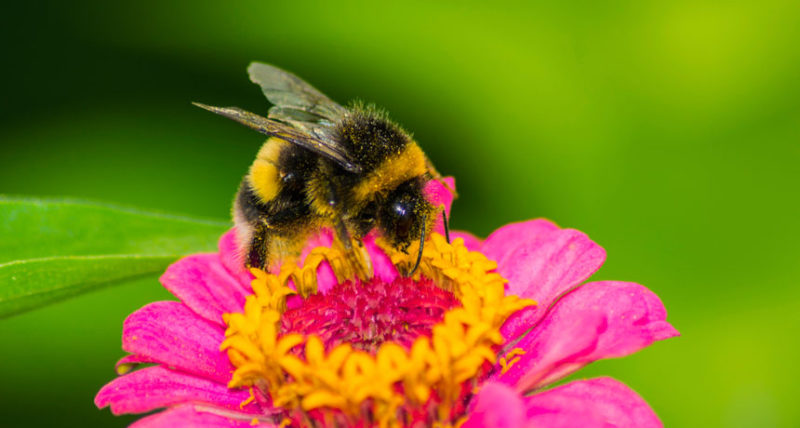It’s Still Just Dirt, The Tillsonburg News – July 2018
by Angela Lassam
Without bees there would be no fresh food. The bees are one of the most important pollinators. Agriculture increasingly realises the natural value of bees and contract with beekeepers to pollinate crops. You may notice bee hives placed strategically on field sidelines especially melon fields locally. When vegetables and fruit are grown in our gardens we naturally get the pollination done for us. The wild habitat they need is disappearing fast as population needs rise so there is an urgency to allow wild spaces to be replanted with relevant vegetation. Gardeners can help too by growing flowers, vegetables and fruit with good and easy access. A corner of the garden could be planted with wild flowers where they can forage naturally.
There are over 40,000 species of bees worldwide and 1,000 of those are found in Canada. Bees have a round body covered in feathery hairs which transport the pollen as they feed and collect for the nest. They have two pairs of clear wings, large compound eyes and a proboscis to collect the pollen. They have a four stage life cycle – egg, larva, pupa and adult. Not all bees survive over the winter. Honey bees gather inside the hive in what is described as a cluster to survive.
Bees do not naturally sting unless stepped on or attacked when foraging for food. The honey bee can only sting once and then will die. They are not normally aggressive and should not be confused with a wasp. Wasps will sting repeatedly and in swarms. They can be distinguished by their very different appearance to the bee. A wasp has a narrow, thin, shiny body with bright coloring and longer thin legs. In spring they will eat insects but come summertime they invade any rotten garbage to eat the sugars collecting there.
In the garden we can help the bees by growing many plants in all seasons. In spring there is crocus, hyacinth and daffodils. For summer any fruit, cosmos, snapdragons, borage, beans and peas to name a few. For fall grow zinnias, asters, goldenrod and echinacea. There are many more worth mentioning but all have flower heads that are single and easy to reach in to get the pollen.
Now some fun facts about bees. They are the only insect that can make food that we can eat. They recognize the human face. They fly at 24 km/hr. They love caffeine.
The past garden tour in conjunction with the Station Arts Centre at the beginning of the month was very well supported and many thanks to all those who purchased tickets. Many hours went into the preparation of the gardens by the garden owners and the volunteer support so thanks there too. Plans are already in progress for another wonderful day next year.
In August there will be a workshop with Mitchell Hewson. The workshop is Saturday, August 11 from 1 to 4 p.m. Two different creams will be made by each participant. Mitchell Hewson, world renowned Horticultural Therapist will lead the hands-on workshop as well as teach about the healing properties of essential oils. Mitchell was extremely well received by the members when he was the society’s guest speaker last October. Contact Judi Misener at judimisener@gmail.com. Non- members are welcome. Open to everyone!
Lastly monthly meetings resume on Tuesday, September 4 @ 7.30 p.m. in the Senior Centre Auditorium, Tillsonburg Community Centre. Topic is Fall Decorating with Hilde Makkink of Sunflower Farm, Tillsonburg.
Everyone welcome. For more information look on Facebook Tillsonburghorticultural or check the website www.tillsonburghorticultural.ca
